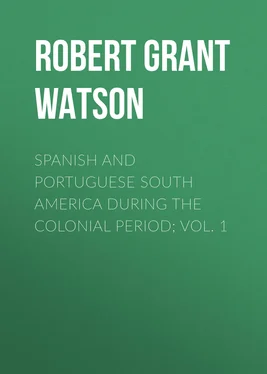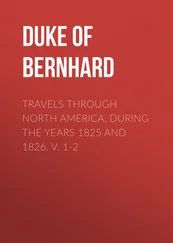Robert Grant Watson - Spanish and Portuguese South America during the Colonial Period; Vol. 1
Здесь есть возможность читать онлайн «Robert Grant Watson - Spanish and Portuguese South America during the Colonial Period; Vol. 1» — ознакомительный отрывок электронной книги совершенно бесплатно, а после прочтения отрывка купить полную версию. В некоторых случаях можно слушать аудио, скачать через торрент в формате fb2 и присутствует краткое содержание. Жанр: foreign_prose, История, foreign_edu, foreign_antique, на английском языке. Описание произведения, (предисловие) а так же отзывы посетителей доступны на портале библиотеки ЛибКат.
- Название:Spanish and Portuguese South America during the Colonial Period; Vol. 1
- Автор:
- Жанр:
- Год:неизвестен
- ISBN:нет данных
- Рейтинг книги:5 / 5. Голосов: 1
-
Избранное:Добавить в избранное
- Отзывы:
-
Ваша оценка:
- 100
- 1
- 2
- 3
- 4
- 5
Spanish and Portuguese South America during the Colonial Period; Vol. 1: краткое содержание, описание и аннотация
Предлагаем к чтению аннотацию, описание, краткое содержание или предисловие (зависит от того, что написал сам автор книги «Spanish and Portuguese South America during the Colonial Period; Vol. 1»). Если вы не нашли необходимую информацию о книге — напишите в комментариях, мы постараемся отыскать её.
Spanish and Portuguese South America during the Colonial Period; Vol. 1 — читать онлайн ознакомительный отрывок
Ниже представлен текст книги, разбитый по страницам. Система сохранения места последней прочитанной страницы, позволяет с удобством читать онлайн бесплатно книгу «Spanish and Portuguese South America during the Colonial Period; Vol. 1», без необходимости каждый раз заново искать на чём Вы остановились. Поставьте закладку, и сможете в любой момент перейти на страницу, на которой закончили чтение.
Интервал:
Закладка:
With the above object in view, the expedition sailed from El Retrete on the 5th of December, but it was only to encounter a continuance of the most stormy weather, in which the caravels were tossed about day and night, and subjected to the most serious risk of being swamped. On the 17th they entered a port resembling a canal, where they enjoyed some days’ repose. On leaving this place of refuge they were again tossed about until the day after Christmas, when they entered another port, in which one of the vessels was repaired. On the day of Epiphany, to their great joy, they anchored in a river close to that of Veragua , to which Columbus, in honour of the day, gave the name of Belen or Bethlehem.
The accounts which the Spaniards had received were now confirmed by what they saw. In exchange for articles of the most trifling nature, they procured ornaments of gold of considerable value; and Don Bartholomew, the admiral’s brother, set off in armed boats to ascend the Veragua , as far as to the residence of the Cacique Quibian. By him he was hospitably entertained, receiving from him the golden ornaments which he wore. But the ships and mariners were not long to rest in quietness, even under the shelter of a river; for a sudden swelling of the waters drove them from their anchors and tossed them helplessly against each other; whilst they were prevented by a violent storm from seeking safety at sea.
Early in February, Don Bartholomew again proceeded with an armed party to explore Veragua , and to seek for the mines. He was misled by the cacique , who directed him into the territories of a neighbouring chief, with whom he was at war. The Adelantado , however, on finding his mistake, set out on a second excursion, during the course of which he was continually met by proofs of abundance of gold, the natives generally wearing plates of that metal suspended from their necks. He was entertained in a friendly manner by the caciques whom he visited, and he found the country cultivated.
On hearing the report of his brother, Columbus resolved to set up a colony on this promising coast, with the object of securing possession of the country and of exploring the mines. The Adelantado was to remain with the greater part of the expedition, whilst the admiral should return to Spain. On this resolve being taken, no time was allowed to be lost. Eighty men were to be left behind, and these were forthwith employed in building houses and a magazine. The chief portion of the artillery and ammunition was stored on board of one of the caravels , which was to be left for the use of the colony. Although the stores were somewhat scarce, no apprehension was felt lest provisions should run short; for the country produced fruits and grain in abundance, whilst the rivers and sea-coast supplied large quantities of fish.
Such was the condition of affairs, and Columbus was on the point of departing, when an unlooked-for obstacle occurred to delay him. He could not of course anticipate the various changes of season in this strange country. The river, which had but recently been a source of danger to him from its becoming flooded, now suddenly became so dry that there was but half a fathom of water on its bar; and over this it was impossible even for the admiral’s small vessel to pass. He had no remedy, therefore, but to have recourse to patience—that virtue of which he stood so much in need throughout his memorable career—and to await the return of the rainy season.
Meanwhile the Cacique Quibian, as was but natural, looked with jealousy upon the proceedings of the strangers who were making themselves so much at home within his territories. Under pretext of preparing for war upon a neighbouring chief, he summoned his fighting men to assemble on the river Veragua . But suspicion was aroused in the mind of the admiral’s notary, who obtained permission to reconnoitre the Indian camp. On his return, he gave it as his opinion that a large party of natives whom he had observed on the march had been on their way to surprise the Spanish settlement. Columbus, being unwilling to accept this view without further confirmation, gave permission to Mendez to proceed on a second scouting expedition, the result of which was such as to dispel his doubts; whilst any lingering disbelief was banished by information conveyed to him by a native who had acted as interpreter, and who revealed to the admiral the designs of his countrymen, which he had overheard. It had been the intention of Quibian to surprise the harbour at night; to burn the ships and houses; and to effect a general massacre.
In view of the above disclosures, Columbus set a double watch upon the harbour: but his brother, the Adelantado , resolved upon more vigorous measures. At the head of seventy-four men, together with the interpreter, he set off in boats for the Veragua , and landed below the house of Quibian, before the latter had notice of his movements. Then taking with him only five men, he ascended the hill, ordering the others to follow with great caution. On a given signal they were to surround the dwelling. The cacique was seized by Don Bartholomew, and, after a violent struggle, was bound hand and foot. His household, consisting of about fifty persons, were likewise made prisoners; and so well were the Adelantado’s measures taken that no blood was shed on the occasion.
Committing his prize to the care of his pilot, with orders to take him on board his boat, the Adelantado , with a portion of his men, set out in pursuit of the Indians who had escaped. But the wily cacique was more than a match for the honest pilot. On his complaining piteously of the pain caused by his bonds, the soft-hearted Sanchez was induced to loosen the cord; upon which Quibian, watching his opportunity, plunged into the water and disappeared. On the following morning the Adelantado , being convinced of the futility of pursuit, returned to the ships with the spoils of Quibian’s mansion, which amounted to the insignificant value of three hundred ducats.
All was now apparently tranquil; and the rainy season having once more set in, Columbus took leave of his brother, and got under weigh with three of the caravels , leaving the fourth for the use of the settlement. The ships, having been towed over the bar, anchored within a league of the shore, to await a favourable wind. It was the intention of the admiral to touch at Hispaniola , and thence to send his brother supplies and reinforcements. As the adverse wind detained him for some time, he sent a boat on shore to procure wood and water. It was well for the colony that he did so. The Cacique Quibian had not perished, as was supposed, but had found his way ashore. When he saw the vessels bearing his family to afar, he was driven to despair, and thought only of vengeance. Assembling his warriors, he approached the settlement secretly, and fell upon the Spaniards when they were completely off their guard. After a severe struggle, the Indians were driven back, but not before they had killed one Spaniard and wounded eight others. Notwithstanding this warning, the boat’s crew sent by Columbus proceeded up the river, and, being surprised by the Indians, were cut off, one man alone escaping.
This misfortune filled the colony with dismay, more especially as the Indians forthwith renewed hostilities. As it was considered no longer safe to remain in the fortress, owing to its vicinity to the wood, the Adelantado erected a barricade in an open space by the sea. The Indians were deterred by the firearms of the Spaniards from venturing forth from the forest; but the latter looked forward with the utmost dread to the hour when the ammunition should be exhausted, and when they should be driven forth in search of food.
Читать дальшеИнтервал:
Закладка:
Похожие книги на «Spanish and Portuguese South America during the Colonial Period; Vol. 1»
Представляем Вашему вниманию похожие книги на «Spanish and Portuguese South America during the Colonial Period; Vol. 1» списком для выбора. Мы отобрали схожую по названию и смыслу литературу в надежде предоставить читателям больше вариантов отыскать новые, интересные, ещё непрочитанные произведения.
Обсуждение, отзывы о книге «Spanish and Portuguese South America during the Colonial Period; Vol. 1» и просто собственные мнения читателей. Оставьте ваши комментарии, напишите, что Вы думаете о произведении, его смысле или главных героях. Укажите что конкретно понравилось, а что нет, и почему Вы так считаете.












